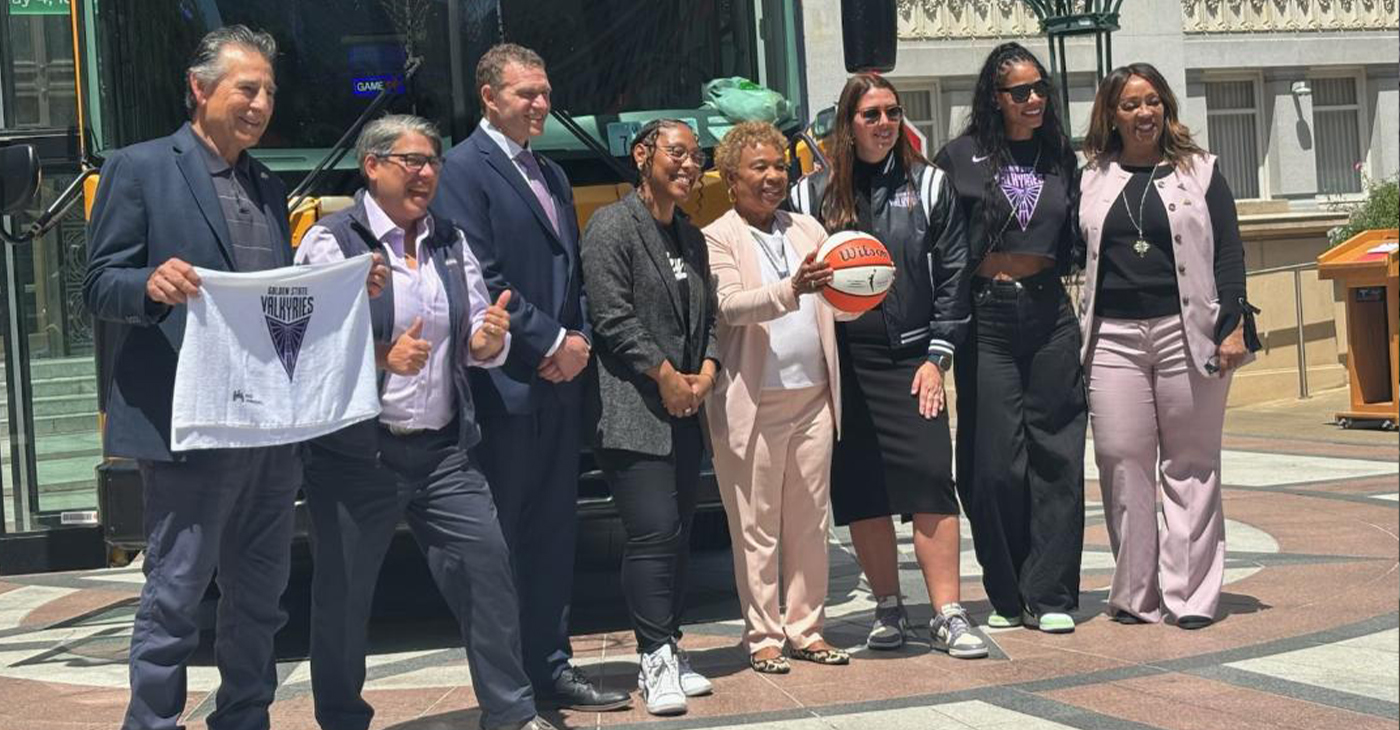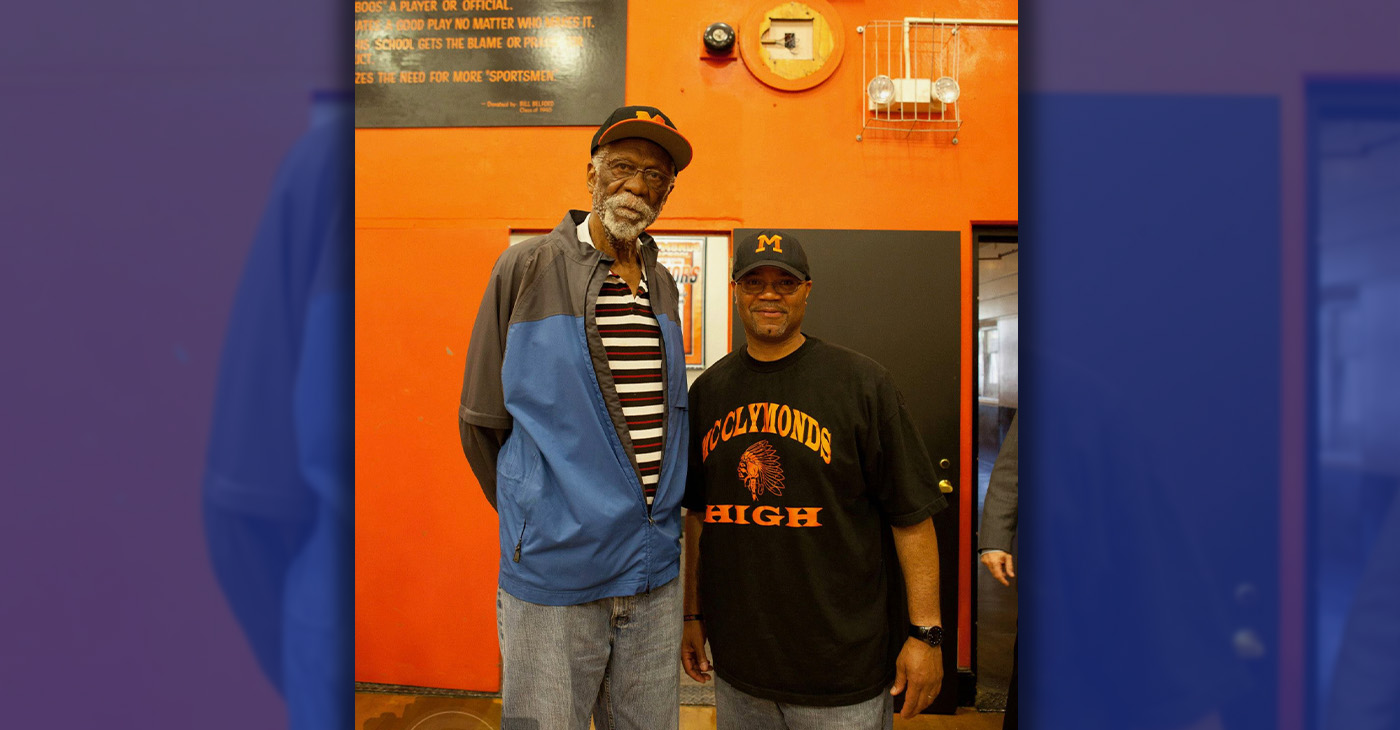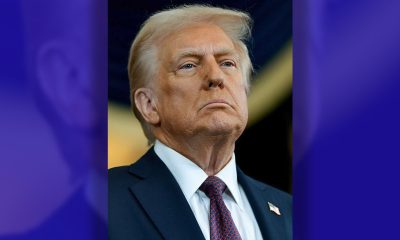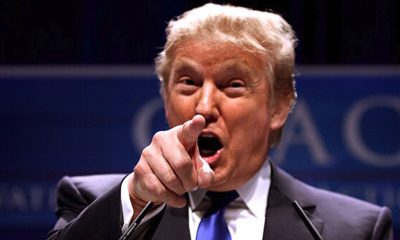Sports
NASCAR Distances Itself from Confederate Flag After Massacre

In this Feb. 15, 2008, file photo, flags, including a Confederate flag, fap in the wind during practice for the NASCAR Sprint Cup Series Daytona 500 auto race at Daytona International Speedway in Daytona Beach, Fla. Though NASCAR bars the use of the flag in any official capacity, many fans fly the flag at their races. (AP Photo/Darryl Graham, File)
MARK LONG, AP Sports Writer
Confederate flags are as easy to find at NASCAR races as cutoff jeans, cowboy hats and beer.
They fly over motorhomes. They adorn clothing. They are regular fixtures, just like Ford and Chevrolet, and that is unlikely to change any time soon.
NASCAR probably would like to see them go away.
The sanctioning body for the motorsports series backed South Carolina Gov. Nikki Haley’s call to remove the Confederate flag from the Statehouse grounds in the wake of the Charleston church massacre. NASCAR issued its statement Tuesday, the same day South Carolina lawmakers agreed to discuss removing the flag and one day after Haley said “the time has come” to take it down. And that is as far as NASCAR appears willing to go for now.
“As our industry works collectively to ensure that all fans are welcome at our races, NASCAR will continue our long-standing policy to disallow the use of the Confederate flag symbol in any official NASCAR capacity,” NASCAR said. “While NASCAR recognizes that freedom of expression is an inherent right of all citizens, we will continue to strive for an inclusive environment at our events.”
International Speedway Corp., NASCAR’S sister company that owns a majority of the tracks, echoed the sanctioning body’s response.
“We join NASCAR in support of South Carolina Governor Nikki Haley’s position on the Confederate flag,” ISC President John Saunders said in a statement. “ISC strives to ensure all fans are welcome to enjoy our events and maintains an inclusive environment at our facilities nationwide. ISC will continue our long-standing practice to prohibit the sale of Confederate flag material on our property.”
Saunders declined a request by The Associated Press for further comment. Other tracks did not respond to requests for comment.
Nine people were slain last week at the Emanuel African Methodist Episcopal Church, and Dylann Storm Roof, 21, is charged with murder. The white man appeared in photos holding Confederate flags and burning or desecrating U.S. flags, and purportedly wrote of fomenting racial violence.
Big retailers like Wal-Mart, Amazon, Sears, eBay and Etsy all said they would remove Confederate merchandise from their stores or websites and politicians across the South called for various steps to move away from the symbol that many associate with racism.
NASCAR has faced criticism over the years for various issues, often involving sponsors. A decade ago, there were questions when hard liquor companies emerged as potential sponsors for a sport built around fast cars and a series whose founding in 1948 gave ex-moonshiners a place to race. More recently, the National Rifle Association drew attention when it struck a sponsorship deal with Texas Motor Speedway not long after the Sandy Hook Elementary School mass shooting in Connecticut.
Confederate flags have been flown by fans at NASCAR races for years. For NASCAR’s Southern 500 at Darlington Raceway, a two-and-a-half-hour drive north of Charleston, a Confederate flag theme was part of poster merchandise from the 1950s into the late ’70s.
Tracks have long and detailed rules for fans, but none involving the content of flags. Although NASCAR has eliminated the use of Confederate flags in any official capacity, it could take things a step further and include language in sanctioning agreements that would ban them altogether at tracks.
But that would be difficult to enforce at tracks with hundreds of acres of infield space and sometimes more than 100,000 fans.
“There’s only so much that you can do with an issue like this if you’re NASCAR,” said Brad Daugherty, a former NBA star and current co-owner of JTG Daugherty Racing.
“But I will tell you, being an African-American man going to the racetrack and seeing the Confederate flag – and I’m a different egg or a different bird because I’m a Southern kid, I’m a mountain kid, I hunt and fish, I love racing,” Daugherty said Tuesday on Sirius XM radio. “But to walk into the racetrack and there’s only few that you walk into and see that Confederate flag – it does make my skin crawl. And even though I do my best to not acknowledge it or to pay any attention to it, it’s there and it bothers me because of what it represents.”
In 2012, NASCAR and track officials canceled plans to have pro golfer Bubba Watson drive the car from the television series “The Dukes of Hazzard” at Phoenix International Raceway, which is owned by ISC. Officials cited concerns about a negative reaction to an image of the Confederate flag on the roof of the “General Lee.”
“The image of the Confederate flag is not something that should play an official role in our sport as we continue to reach out to new fans and make NASCAR more inclusive,” NASCAR spokesman David Higdon said at the time. Watson said he didn’t “stand for the Confederate flag” and noted that NASCAR was “built on moonshining,” an occasional theme in the TV show.
Former “Dukes” actor and ex-Georgia Congressman Ben Jones criticized that decision.
“As a cast member of ‘The Dukes of Hazzard’ and the owner of several ‘General Lees,’ I can attest that the car and our show reflect the very best of American values, and that Hazzard County was a place where racism was not tolerated,” said Jones, who played the mechanic Cooter on the show. “This action by NASCAR is a provocative and unnecessary overreaction to a problem that doesn’t exist. It is a disgraceful and gratuitous insult to a lot of very decent people.”
___
AP Sports Writer Luke Meredith contributed to this report.
Copyright 2015 The Associated Press. All rights reserved. This material may not be published, broadcast, rewritten or redistributed.
Alameda County
Seth Curry Makes Impressive Debut with the Golden State Warriors
Seth looked comfortable in his new uniform, seamlessly fitting into the Warriors’ offensive and defensive system. He finished the night with an impressive 14 points, becoming one of the team’s top scorers for the game. Seth’s points came in a variety of ways – floaters, spot-up three-pointers, mid-range jumpers, and a handful of aggressive drives that kept the Oklahoma City Thunder defense on its heels.

By Y’Anad Burrell
Tuesday night was anything but ordinary for fans in San Francisco as Seth Curry made his highly anticipated debut as a new member of the Golden State Warriors. Seth didn’t disappoint, delivering a performance that not only showcased his scoring ability but also demonstrated his added value to the team.
At 35, the 12-year NBA veteran on Monday signed a contract to play with the Warriors for the rest of the season.
Seth looked comfortable in his new uniform, seamlessly fitting into the Warriors’ offensive and defensive system. He finished the night with an impressive 14 points, becoming one of the team’s top scorers for the game. Seth’s points came in a variety of ways – floaters, spot-up three-pointers, mid-range jumpers, and a handful of aggressive drives that kept the Oklahoma City Thunder defense on its heels.
One of the most memorable moments of the evening came before Seth even scored his first points. As he checked into the game, the Chase Center erupted into applause, with fans rising to their feet to give the newest Warrior a standing ovation.
The crowd’s reaction was a testament not only to Seth’s reputation as a sharpshooter but also to the excitement he brings to the Warriors. It was clear that fans quickly embraced Seth as one of their own, eager to see what he could bring to the team’s championship aspirations.
Warriors’ superstar Steph Curry – Seth’s brother – did not play due to an injury. One could only imagine what it would be like if the Curry brothers were on the court together. Magic in the making.
Seth’s debut proved to be a turning point for the Warriors. Not only did he contribute on the scoreboard, but he also brought a sense of confidence and composure to the floor.
While their loss last night, OKC 124 – GSW 112, Seth’s impact was a game-changer and there’s more yet to come. Beyond statistics, it was clear that Seth’s presence elevated the team’s performance, giving the Warriors a new force as they look to make a deep playoff run.
Barbara Lee
WNBA’s Golden State Valkyries Kick Off Season with Community Programs in Oakland
“The Golden State Valkyries are more than a team—they’re a movement,” said Oakland Interim-Mayor Kevin Jenkins. “Their touchdown in Oakland marks a new era of opportunity, inspiration, and equity in sports. This partnership reflects our city’s deep commitment to uplifting women, investing in youth, and building a community where every dream has a place to grow. We’re proud to welcome the Valkyries to The Town.”

Team installs new nets at playgrounds, holds flag-raisings at City Halls in Oakland and S.F.
Special to The Post
The Golden State Valkyries brought the excitement of their inaugural season to every corner of the Bay Area with a full slate of community celebrations leading up to their historic home-opener against the Los Angeles Sparks at the Chase Center in San Francisco on Friday.
The week featured flag-raising ceremonies at city halls in Oakland and San Francisco, three “Violet Net” installation days at Oakland parks to encourage basketball play, fun “Hoopbus” takeovers at multiple schools presented by Kaiser Permanente, and player appearances.
“The Golden State Valkyries are more than a team—they’re a movement,” said Oakland Interim-Mayor Kevin Jenkins. “Their touchdown in Oakland marks a new era of opportunity, inspiration, and equity in sports. This partnership reflects our city’s deep commitment to uplifting women, investing in youth, and building a community where every dream has a place to grow. We’re proud to welcome the Valkyries to The Town.”
In total, 90 violet nets were installed on 45 basketball courts across 34 public parks throughout Oakland this week. A list of the parks receiving violet nets can be found at Valkyries.com.
About the Golden State Valkyries
The Golden State Valkyries, the WNBA affiliate of the seven-time NBA Champion Golden State Warriors, were announced as the 13th WNBA franchise on Oct. 5, 2023. According to Norse mythology, Valkyries are a host of warrior women who are fearless and unwavering – flying through air and sea alike.
This brand is Golden State’s modern interpretation of Valkyries: strong, bold, and fierce. Tipping off during the 2025 WNBA season, the team is headquartered in Oakland and will play home games at Chase Center in San Francisco. For Golden State Valkyries’ assets, including team logos, visit valkyries.com.
Activism
McClymonds High Names School Gym for Star Graduate, Basketball Legend Bill Russell
William “Bill” Felton Russell was born on Feb. 12, 1934, and died on July 31, 2022. He achieved fame as a U.S. professional basketball player who played center for the Boston Celtics of the National Basketball Association (NBA) from 1956 to 1969. He was the centerpiece of the Celtics dynasty that won 11 NBA championships during his 13-year career.

By Ken Epstein
West Oakland’s McClymonds High School, “the School of Champions,” this week named the school’s gymnasium in honor of one of its most famous graduates, basketball legend Bill Russell (class of ’52).
William “Bill” Felton Russell was born on Feb. 12, 1934, and died on July 31, 2022. He achieved fame as a U.S. professional basketball player who played center for the Boston Celtics of the National Basketball Association (NBA) from 1956 to 1969. He was the centerpiece of the Celtics dynasty that won 11 NBA championships during his 13-year career.
Russell is widely known as one of the greatest basketball players of all time. In 2011, he received the Presidential Medal of Freedom, the country’s highest civil honor, from President Barack Obama for Russell’s contributions to basketball and the Civil Rights Movement.
The McClymonds’ naming ceremony was held on Wednesday, the same day as Russell’s birthday. Oakland leader Bill Patterson, a longtime friend of Russell’s, was scheduled to cut the ribbon at the reopening of the gym, which had been closed for several months for renovation. Russell’s daughter Karen was scheduled to attend the ribbon cutting.
Russell’s name and signature are now printed on the gymnasium floor.
Patterson was working at DeFremery Park when he met Russell. “I befriended him as a boy and during his years at University of San Francisco” said Patterson. “We stayed friends for the rest of his life.”
Said McClymonds Principal Darielle Davis, herself a McClymonds graduate, “We are excited to honor Bill Russell for his sports accolades and because he broke color barriers. He is part of our legacy, and legacy is really important at McClymonds.”
Brian McGhee, community schools manager at McClymonds and former football player at UC Berkeley, said that Russell meant a lot to him and others at the school. “He was a beacon of light and hope for West Oakland,” he said. “He did a lot for sports and for civil rights.”
Starting in 2018, Ben “Coach” Tapscott worked with Patterson and other McClymonds grads, community members, and former coaches to encourage the Oakland Board of Education to endorse the naming of the school gym, which finally happened recently.
“We worked hard to make this happen,” said Tapscott. “He’s an important part of McClymond’s history, along with a lot of other famous graduates,” he said.
-

 Activism3 weeks ago
Activism3 weeks agoOakland Post: Week of November 12 – 18, 2025
-

 Activism3 weeks ago
Activism3 weeks agoIN MEMORIAM: William ‘Bill’ Patterson, 94
-

 Activism3 weeks ago
Activism3 weeks agoHow Charles R. Drew University Navigated More Than $20 Million in Fed Cuts – Still Prioritizing Students and Community Health
-

 Bay Area3 weeks ago
Bay Area3 weeks agoNo Justice in the Justice System
-

 #NNPA BlackPress3 weeks ago
#NNPA BlackPress3 weeks agoThe Perfumed Hand of Hypocrisy: Trump Hosted Former Terror Suspect While America Condemns a Muslim Mayor
-

 #NNPA BlackPress2 weeks ago
#NNPA BlackPress2 weeks agoTrump’s Death Threat Rhetoric Sends Nation into Crisis
-

 #NNPA BlackPress2 weeks ago
#NNPA BlackPress2 weeks agoLewis Hamilton set to start LAST in Saturday Night’s Las Vegas Grand Prix
-

 #NNPA BlackPress4 weeks ago
#NNPA BlackPress4 weeks agoProtecting Pedophiles: The GOP’s Warped Crusade Against Its Own Lies




























































